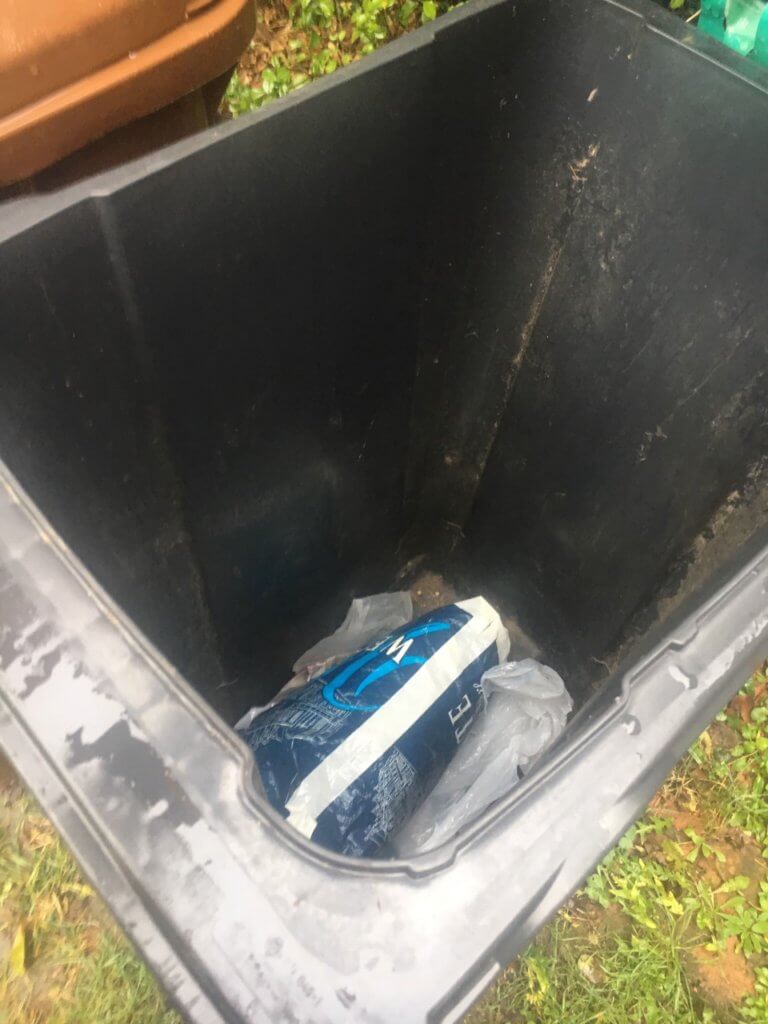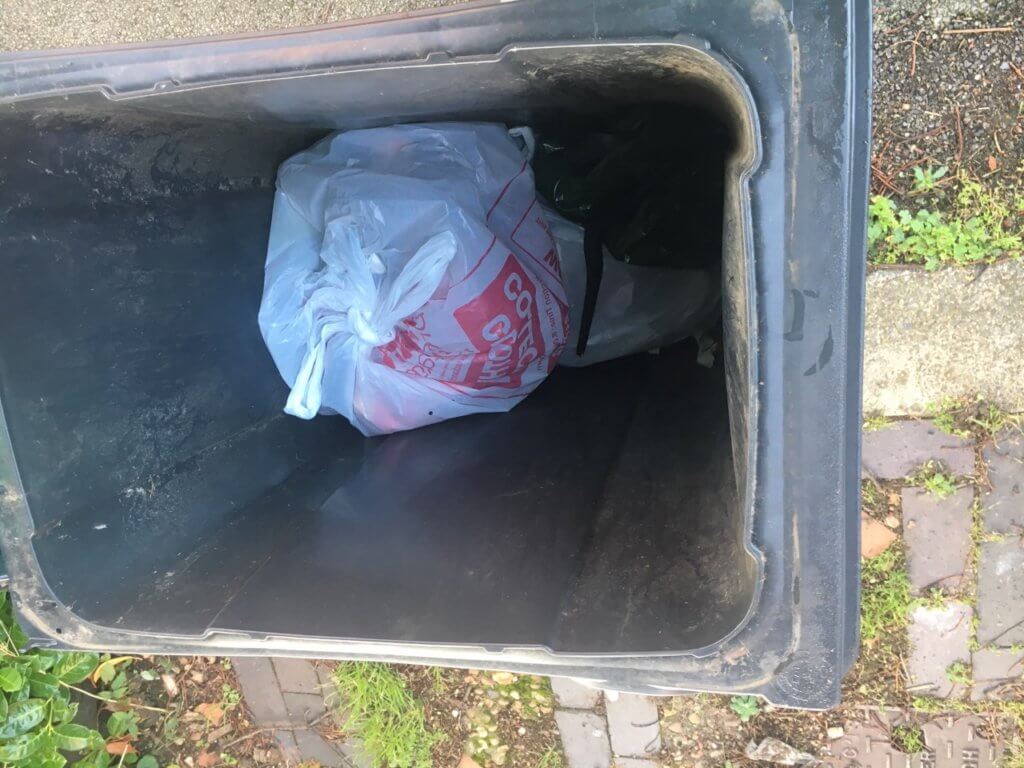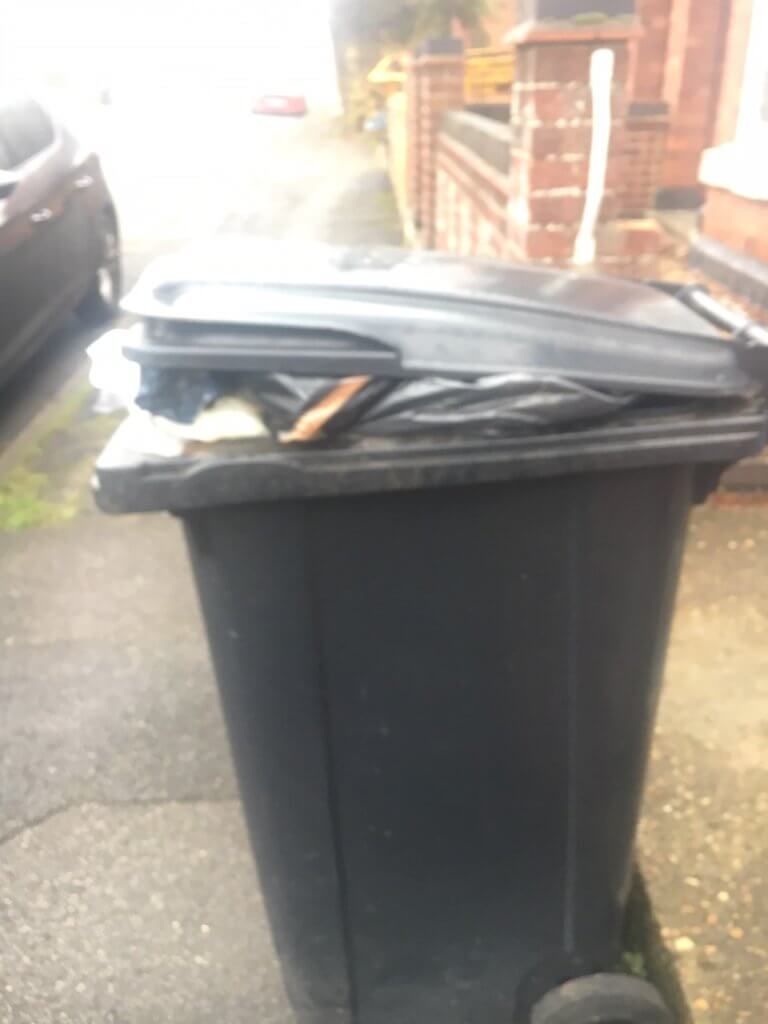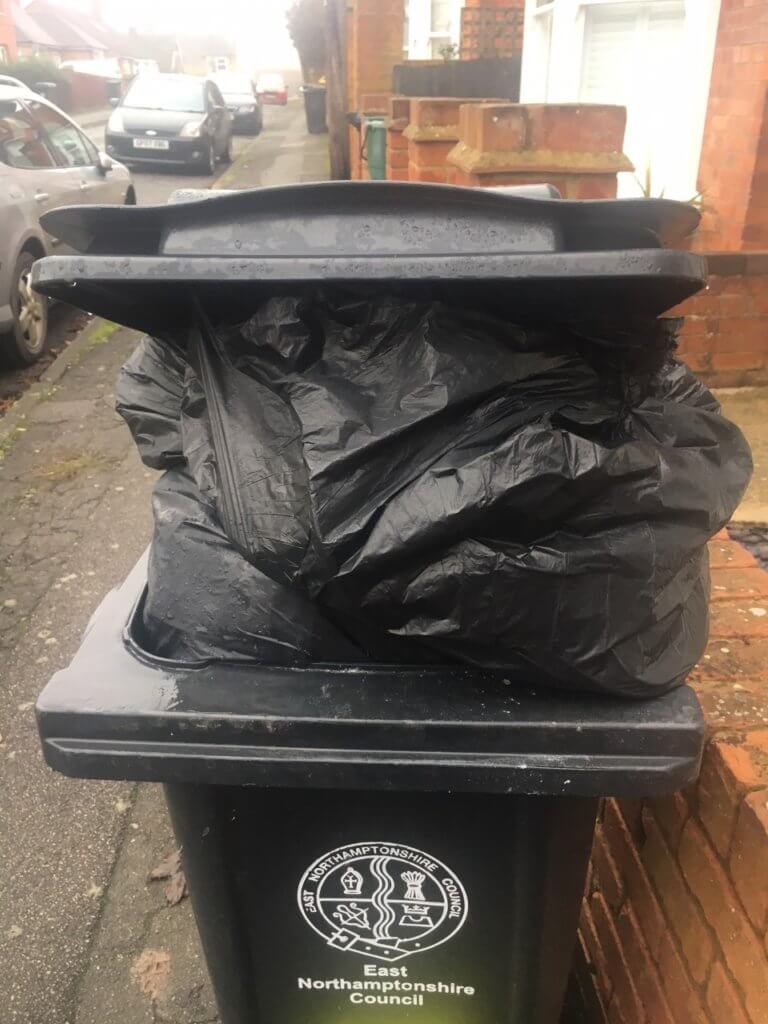
We have our rubbish (non-recyclable) collected once a fortnight. This was the contents of our bin two weeks ago so it didn’t seem worth putting out.
Yesterday, after another two weeks, we had added another small bag (mostly plastic wrapping that is non-recyclable)(see below).

But further down our street the bins are bulging (every fortnight), like these examples


On alternate weeks, when the green recycling bin is emptied, then our bin seems to be pretty full every fortnight whereas others in the street seem rarely to put their bins out.
It is difficult to get away from the thought that many of my near-neighbours are not separating their recyclable ‘rubbish’.
I wonder what would be the best way to encourage more recycling? Any thoughts?
Council workers going round looking in people’s bins and giving warning notices – then fines – this coupled with a publicity campaign showing the value of recycling and the jobs it can create. Such Council activity would bring uproar from those who don’t recycle but it has to be done.
You can see how well your local council performs with respect to household waste recycling rates here https://www.letsrecycle.com/councils/league-tables/2016-17-overall-performance/.
East Northants is about mid table at position 135 with a rate of 46.5% re-use, recycling or composting. This is well below the best performing councils which are achieving over 60% but substantially better than the worst – London Borough of Newham achieves just 14% (2016/17 figures). Of course it is not entirely fair to compare councils with substantially different populations and housing characteristics – Newham will include a much larger part of the population living in apartment blocks and houses of multiple occupancy (where it is more difficult to achieve good recycling rates) compared to the leafy suburbs and the shires.
As usual, a thought provoking blog post., Mark. I think we manage to keep less our black bin much less than half full over a two week cycle. My neighbours seem to be similar. Charging for collection by weight is intuitively attractive but the total annual cost per household is a small fraction of the community charge. Say £100. If you were to charge more for households which consistently filled or over-filled their non-recyclable bin, then it would be hard to justify an increase of more than 50%. That would mean only a £50 increase on a total charge of £1200. It’s not a great incentive. Add to that the cost of monitoring and enforcement and you have significant adminstrative burden. Similar sentiments apply to the imposition of fines for non-compliance.
I have no quick fix. Education is key and perhaps younger people brought up in a recycling culture will slowly replace the resistant oldies.
With so many aspects of life, it seems that a cultural change has to come before mass participation (I suppose we are a tribal animal after all and mostly tend to follow our ‘tribe’).
Also while charging for weight can seem like a good idea, they had it in New Zealand when I was there, and the main problem seemed to be that if people had lots of waste, they just took it out and dumped it somewhere (often in the conservation areas where I was working).
It certainly doesn’t help that recycling appears to be over-complicated with different councils (even adjoining) accepting different materials. Here in North Yorkshire there are differences between adjoining councils. In Selby, you can put most plastics out, but next door York, will only take bottles.
For some people, separating out different bits of ‘rubbish’ is too much effort after a culture of just dumping everything into a bin and it then miraculously disappearing built up over decades – perhaps also its a culture which considers all waste to be ‘dirty’ and therefore it’s a job for ‘other’ people to do!
Better education about where it all goes and what recycling centre staff have to do with it when it arrives would certainly help to make sure that people recycled appropriately.
Rewarding good recyclers with something like a council tax rebate rather than fining those stuck in a cycle of dumping everything out of sight, and out of mind, would also help. A carrot is generally better than a stick at changing societal attitudes.
It could be a bit fiddly to make it work, but if in association with better education and involving children there was a mechanism whereby half of the financial savings from sending less crap to landfill through better reduce, reuse, recycle went back into the community – school trips, home insulation for OAPs etc then we might be on to a winner. Very well worth trying, one half of the potential savings in my council area amount to £500,000 plus per year, a major new source of funding created by nothing more than people using their recycling bins properly. There’s enormous scope for developing the 3Rs, especially reduce, as a new source of funds for good causes – potentially in the billions.
Imposition of recycling and fines for non-observance appear arse-about-face to the RRR mantra
In Germany, or at least in parts, recycling is compulsory.
Sorting this problem out will first of all acknowledging that it exists, I’ve spent nearly 30 years trying to make that happen. Next February it will be 30 years since I started work as an Employment Trainee on the Scottish Conservation Projects Blue Bag Waste Paper Recycling Scheme. This was back in the day when environmentalism was about the whole thing not incessant, repetitive Climate Change. As is standard with recycling schemes we began in areas where traditionally there had been good support for kerbside recycling. This is why you used to get new recycling projects giving glowing reports about public support, then later on there are reports of poor over all recycling rates. From direct personal experience I found that there’s a very strong correlation between social economic status and whether or not people can be bothered to recycle – typically, and I can’t think of any exceptions, once you went into a council estate you really struggled, in areas where people had less disposable income they actually put more in the rubbish bin. From a political perspective this was awkward, so groups like Friends of the Earth Scotland for years fell back on the ruse of selling supposed public support on the basis of asking the man\woman in the street whether or not they wanted recycling – instead of looking at what was really happening, or not happening, in existing kerbside schemes. So local authorities were pushed into providing comprehensive recycling schemes that weren’t going to work over quite extensive areas. In my own district the council is losing over a million pounds a year because residents are not using the recycling scheme properly and material is needlessly being sent to landfill. Across Scotland the figure is over 50 million annually. Ten quid per every man, woman and child here. Funnily enough a few weeks ago I was looking through the micro film records at our central library for a letter I’d sent into my local paper nearly 15 years ago saying that this was going to happen.
It didn’t need to – way back in September 1989 as our scheme expanded into new areas and public support collapsed in the less plum ones we did a trial with a local primary school where we bypassed adult indifference by directly approaching younger children to recycle. The results were fantastic, in an area with lots of vandalism, litter, graffiti, dog shit in the street and what to me was general apathy the kids were incredibly enthusiastic and showed up their ‘peers’. As an accidental bypoduct of obtaining ‘waste’ paper the scheme delivered real social inclusion in an area where it was desperately needed. Sadly the organisation we worked for was just not interested in working with schools, the real role of the project seemed to be as a source of funds for then flavour of the month recycling. Unbeknownst to us in the Brazilian city of Curitiba, sometimes called the world’s greenest one, they were dealing with the same issue of poor recycling support in lower income areas by going directly to younger kids too. They kept at it and the result, which doesn’t surprise me, is that today more than 90% of the children of those involved all those years ago are avid recyclers themselves now. There was a pretense that all you had to do was buy the recycling containers and the public would do the rest, delusional if not an outright lie. The real investment needed was in public education and working with schools, but that would have meant recognising some awkward truths. Sadly I’ve seen that is pretty much the standard and doesn’t just apply to recycling. I’m currently involved with others in trying to set up an anti waste campaigning group – 6R (Reduce, Reuse, Recycle, Re-educate, Re-employ, Rewilding). – conserving material resources is utterly fundamental, you don’t get any more basic than that in protecting life and we are failing at it. Well done and thanks Mark for highlighting this.
Even for the committed it is too complicated. I’m pretty sure I put items which can’t be recycled into recycling bins. As previously commented, different councils have different instructions. You often need to read the small print on plastic packaging which may be recycled at some large supermarkets but not by the council. Often paper has been treated with plastics and it is not obvious to the consumer. Most teabags have plastic in the glue so don’t compost them. Cigarette ends have plastics in them. Glitter is plastic – I always thought it was metal. Don’t buy anything with glitter on it. Tetrapack cartons are a problem. And so it goes on.
Charging to tip at Council tips has just meant a huge increase in fly-tipping. The same would happen if households were charged for weight. Reduction in Council tax for economical households may sound good but may result in fly-tipping also to get the refund.
I think one way forward is to legislate against unnecessary and non-biodegradable packaging. In any case, it seems very little of the so-called recyclable material actually gets recycled – I suspect a lot of it is dumped on the less-developed nations.
Until very recently, shopkeepers thought you were weird if you refused to take purchases in plastic bags. It’s changing but, for instance, supermarkets still provide small plastic bags for fresh produce whilst priding themselves on charging for plastic bags at the till. Crazy!
“Charging to tip at Council tips has just meant a huge increase in fly-tipping”.
In most local authority areas residents can bring household waste to council disposal sites free of charge. They may need to provide evidence of residence in the borough but otherwise can bring a wide variety of different wastes without a charge. There really is no excuse for householders to fly-tip their waste.
Commercial waste contractors are required to pay to deliver waste to disposal/recycling sites, including landfill tax if the waste is landfilled. At the bottom end of the market – e.g. the ‘white van’ household clearance businesses this can and does lead unscrupulous operators to fly-tip, in some cases on a large scale. Undesirable though this is, I think it is appropriate that commercial operators should pay to dispose of waste and the way to deal with the fly-tipping problem is not by eliminating charges (someone has to pay so why should it be the community as a whole rather than the person whose waste it is?). Environmental law places a legal duty of care on all waste producers to ensure that their waste is legally disposed of and since 2005 this has applied to householders as well as businesses. What this means in practice is that if you employ someone to dispose of waste the onus is on you to take reasonable steps to check that they are legally authorised to do so i.e. by seeing a copy of their registration as a waste carrier and/or by contacting the Environment Agency/Natural Resources Wales to verify that the operator concerned is registered. Failure to take these steps could lead to you being prosecuted if fly-tipped waste is subsequently traced back to you.
Interesting article and comments. I particularly liked Les’s observations of the inconvenient relationship between recycling rates and socio-economic class and that the best way to ensure better recycling rates was via initiatives in schools. I agree with Pete’s comments that the Council need to open a few of the black bags and have a word (or more) with the householder where recyclables are found in them.
Charging by weight of black bags seems a non-starter to me as it would surely be too costly and bureaucratic for local authorities to run such a scheme efficiently (and plastics don’t weigh much anyway) – and could lead to increased fly-tipping or burning rubbish in the garden.
Also key to winning wider public support is ensuring that the waste is dealt with locally rather than exported – you quickly lose any argument about recycling if the rejoinder is the waste is being dumped in someone else’s country. And, as also noted above, complexity is an issue with changes in what plastics can be recycled undermining people’s confidence that what they put in the recycling bags doesn’t impact the ability of the recycler to recycle it. Who, other than me, routinely removes plastic bottle tops before disposal? (Probably lots of people but the ‘right’ answer, exasperatingly, is: none of the rest of the household – however much I say you’re supposed to! (Although that’s in South Wales – different rules may apply elsewhere for all I know.))
One strand that seems missing from the debate here is that of making the polluter pay. Why are councils and council tax payers forced to foot the bill for recycling and rubbish disposal costs when so much of what is thrown away is unavoidable unless ? I think in Germany and some other European countries the manufacturers or retailers have been made to pick up a high proportion of the costs of recycling for many years now. The government here seems belatedly to have picked up on what seems an obvious idea – see:
https://www.theguardian.com/environment/2018/nov/11/retailers-to-pay-up-to-1bn-more-for-recycling-under-waste-strategy
If producers and supermarkets (and other retailers) paid in proportion to the waste they generate wouldn’t they begin to cut down on packaging?
So perhaps a starter package might be
Education
A convincing and defensible government driven waste strategy that makes the polluter pay, reduces the amount of waste generated and ensures waste is not exported
Regulation to reduce the production of unrecyclable components
Backed up by more information about what happens to the waste that is recycled
And some more education
All within a framework that gives an educated public confidence that we are now living in a world where our leaders (and we) have been forced to confront the twin issues of climate change and catastrophic biodiversity loss! Or what’s the point anyway?
Regulations
Regulatory measures include legislation, standards and licences
Require the entire chain of a products life to comply with zero waste principles.
All new products, by-products, services and processes to comply with eco or zero waste design obligations – use of non hazardous materials (eg water based paints), conservation/minimum use of materials, easy disassembly, repair, re-use, recyclability, compostability.
Phase out use of non-recyclable or hazardous resources Reduce use of virgin materials in products.
Require larger retailers to support local recycling services
Ban mixed plastic packaging (which prevents it from being recycled)
Mandatory take-back systems (especially for transport packaging companies eg pallets, cardboard; secondary packaging and primary packaging eg cans, jam jars etc);
Minimum recycled content standards (especially in non-food packaging);
Secondary materials utilization rate requirements;
Energy and resource-efficiency standards;
Ease of dismantling requirements (for re-use, repair, replacement or upgrading of parts);
Disposal bans and restrictions;
Materials bans and restrictions;
Product bans and restrictions
Trade protection measures
Mandatory (as in Nova Scotia) deposit/refund system for all beverage containers.
Ban thermal treatment of mixed waste.
Fiscal Measures
Include environmental taxes, tax breaks and exemptions or subsidy reforms which aim to change price signals in the market place in favour of more environmentally friendly products and services (eg the plastic bag tax).
Polluter taxes
Disposal taxes
Virgin materials tax
Climate change tax (for industries like the meat (animal body parts) trade which are massive methane polluters)
Energy taxes
Abstraction taxes
Product levies
Landfill Taxes
Incineration Waste Taxes
Deposit Refunds
Emissions targets
Primary resource taxes for aggregates
Resource toxicity taxes eg heavy metals etc
Short life/single use taxes for disposable products or packaging (eg plastic bags, food packaging, disposable nappies)
Tax rebates for eco-design/producer-responsibility schemes.
Variable charges for waste licences. (Small traders could use civic amenity sites or landfill sites for less cost.)
Deposit/refund take-back systems operated by retailers Retailers operating take-back schemes to receive recycling credits from local authorities to meet storage costs
Phase out subsidies for polluting industries like incineration
Fines for councils for not reaching recycling and composting targets
Fiscal support for local governments achieving green procurement goals
Introduce householder recycling incentive schemes (eg prize draws for householders who recycle and recycle correctly)
PFI should support less capital intensive projects (Recycling / composting plants are far cheaper to set up and run compared to incinerators, pyrolysis plants and other large scale technical disposal plants.)
Infrastructure and Policy
Develop regional development agencies to promote and support secondary materials industries and resource efficiency, eco-design and hazard and pollution reduction technologies (by, for example, technological change or change of materials)
Use of recyclables and compostables is key to developing the re-use market. To boost recycling materials the market needs to ensure security of supply, high quality materials by increased and improved sorting, provision of market supplier information, development of a larger number of local supplier outlets, and development of recycling technology businesses.
Councils to provide clean recycling systems:
Provide householder food waste collection service. (Exclusion of food from waste bins allows waste bins to be collected less frequently; and prevents methane being produced in landfill)
Provide householder compost waste collection service
Provide a householder hazardous materials collection service (to exclude hazardous materials like batteries, electrical equipment, oils, cleaning products, medicines, pesticides, herbicides, paints, glass bottles etc from the mixed waste stream which cause contamination of waste and the need for expensive (unworkable) technological fixes. (Many councils, for example) produce ‘compost like material’ that doesn’t even have to contain plant nutrients by ‘sieving’ putrescibles from mixed waste. This material is contaminated with hazardous fluids, glass, small pieces of plastic etc. It is then ground down to a powder to grind up glass shards and ‘good, clean’ compost is then added to this material to create the correct structure. Madness!)
Provide half-price recycling, food and composting bins but charge for waste bins and hazardous materials bins
Variable charging by weight ratio of waste and recycling collections. (Bins can be tagged to identify bins electronically.)
Develop local packaging return schemes
Develop local resource exchange schemes for householders and industry
Promote local repair and up-cycling businesses
Government targets for local government, NHS green procurement
Government targets for local infrastructure/network development for wider green industries (but including re-processing, recycling and composting industries) (to reduce energy and transport costs).
Phase out mixed waste incinerators. (Single materials waste incinerators enable pollutants to be more easily controlled.)
Prohibit Councils from entering contracts of more than 5 years with waste companies. (Incinerator companies often lock councils into 25 year contracts which strangles options for developing alternative initiatives.)
Prohibit Councils from entering into contracts with incinerator companies which require them to provide minimum tonnages of plastics or paper
End commercial confidentiality for waste contracts
Support local, community-based organisations/businesses
Education and Training
Includes education of householders and industry and training of key policy providers
Training required for designers and product manufacturers of eco issues and responsibilities; legislation etc
Provision of market supplier information for industry and householders.
Consumer environmental information needs to be in a usable, honest, clear form which can allow fair comparison of products. Environmental information labelling could cover energy efficiency, CFC use, recycled content, product hazard rating, expected lifetime and product disassembly and durability.)
Promote press stories of local businesses and interesting people in the industry
Education in schools, at events, media advertising.
It might seem sad, but for a lot of people money is the biggest motivator. Therefore having a refundable deposit on as many items as possible would seem like the best solution. Everything has a barcode on it so it should be possible to have collection sites at supermarkets where you scan the barcode on your empty package, bottle etc, and the machine tells you if it can be accepted, and works out how much you are owed based on what you put into the machine. Would take quite a lot of money to set up such a system, but if the deposits were high enough (say 20p per item) then all recycling would be done this way and there would be no need for council collections, thus saving them money in the long run. Even better than recycling would be to focus on the other 2 R’s (reduce and reuse). I might be showing my age a bit here but I can remember when milk was delivered in reusable glass bottles (by an electric milk float) and pop bottles were glass and had a 10p deposit on them. Lets go back to the good old days. Alternatively instead of buy water or soft drinks in recyclable bottles, surely shops could have dispensing machines where you insert your own bottle and it gets filled with the water/fizzy drink of your choice. A tough plastic (or even metal) bottle as used by hillwalkers for example might require up to 50 times as much energy and resources to manufacture as a single use bottle, but could be refilled daily for years, so would save a huge amount of resources in the long run.